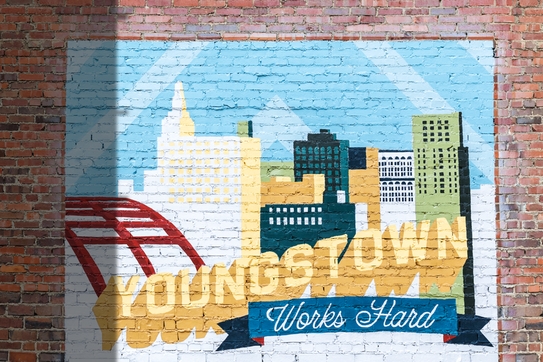Last summer, in the midst of the COVID-19 shutdown, professors Bruce Usher and Todd Jick found themselves torn about whether to offer their popular fall course, Bridging the American Divides.
The class demands that students delve into the sensitive topics that are contributing to an ever-widening rift in the country—economic inequality, immigration, racial injustice, and the opioid crisis, to name just a few. With the pandemic necessitating remote learning, how could students discuss these issues frankly and openly on Zoom?
Moreover, the course has traditionally been built upon a trip to either Youngstown, Ohio, or Decatur, Alabama, small cities where many of the American divides are writ large; the pandemic would take that off the table, too.
“We didn’t have the centerpiece of the course to offer, which was students going physically to these communities and seeing them with their own eyes,” says Jick, an expert in organizational change in the Management Division and the Reuben Mark Faculty Director of Organizational Character and Leadership at the Sanford C. Bernstein & Co. Center for Leadership and Ethics. Ultimately, the professors opted to offer the course. “Whatever risks there were, it was a greater risk not to have dialogue around these issues,” Jick recalls concluding.
The issues are numerous and difficult to untangle. The course, first offered in 2017, was originally called Bridging the American Divide, and focused mostly on the stark economic difference between thriving urban areas like New York and Rust Belt cities hit hard by the decline of manufacturing. This year, Usher and Jick pluralized the word “divide” in the course name after asking themselves, recalls Jick, “Is there one singular divide under which everything else falls, or is there a panoply of interconnected divides—a sort of intersectionality? We came down on the side of intersectionality. Economic forces contribute to it, and social forces, and geographic forces, and life-experience forces.”
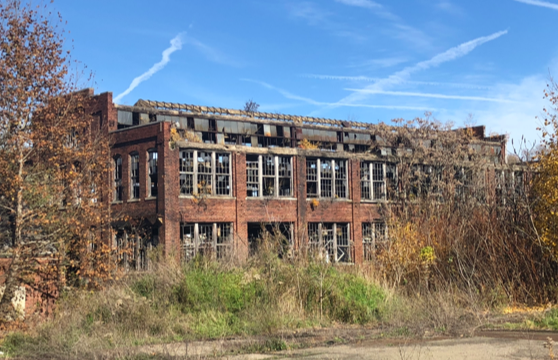
(Above) The Republic Rubber Company plant in Youngstown, Ohio, has been closed since 1989. (Below) The Lordstown Motors Corp., an electric-vehicle startup, took over a closed GM plant in a nearby town, and is currently focused on building electric pickup trucks. Photography: Todd Jick; Lordstown Motors Corp.
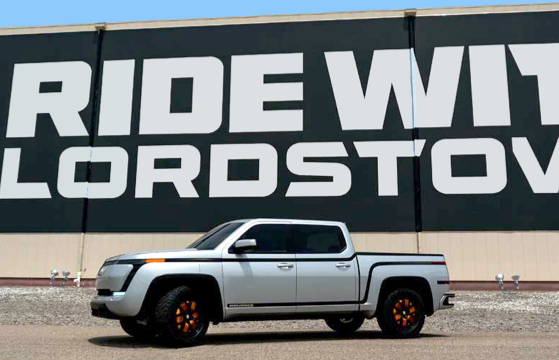
“In most courses, we tend to teach at the strategic level. This is what you do to be more successful in business—you automate your business, you globalize your business. We don’t always spend time on what that means for the individual communities involved.”
—Professor Bruce Usher
A Business Lens
Though the class tackles a range of issues, Usher points out that because Bridging the American Divides is a business school course, students are tasked with viewing the issues through a business lens. In the first meeting, the professors lay out an overarching philosophy—one famously adopted by the Business Roundtable in 2019, that says companies are beholden not only to shareholders, but also to other stakeholders, including the communities in which they operate.
Each subsequent class session explores a different divide through comprehensive readings and discussions that one student describes as “pretty spicy.” One week the class discusses how systemic racism has led to vast inequalities, ultimately impacting the broader economy. Another week, the students discuss how corporations have contributed to the affordable housing crisis. On yet another week, they discuss automation’s impact on businesses. Throughout, they explore the ripple effect business decisions have on workers, communities, and beyond.
“What’s good for American business isn’t necessarily good for all Americans,” says Usher, co-director of the Tamer Center for Social Enterprise and the Elizabeth B. Strickler ’86 and Mark T. Gallogly ’86 Faculty Director. “In most courses, we tend to teach at the strategic level. This is what you do to be more successful in business—you automate your business, you globalize your business. We don’t always spend time on what that means for the individual communities involved.”
Being able to see firsthand how decades of business decisions have impacted the individual communities was at the root of the original class, an idea conceived by Professor Ray Horton, the Frank R. Lautenberg Professor Emeritus of Ethics and Corporate Governance. The concept came to him days before the 2016 presidential election while taking part in a town hall with then-dean Glenn Hubbard about the rise of American populism. Horton asked students who among them had traveled in the US apart from trips to cities like LA and San Francisco. When only a few raised their hands, it became clear, he says, “how far removed those of us in the room were from what was going on in the rest of the US.”
That first iteration of the course explored the split between those living in thriving, urban areas like New York City, and residents of smaller cities in the Midwest that have seen their populations decline and unemployment rise, and have been hard hit by the opioid crisis.
Horton and Usher, who co-taught the first year of the course in 2017, built a trip to Youngstown, Ohio, into the course curriculum. Youngstown is emblematic of a Rust Belt city; historically industrial, its population has fallen as the steel industry shifted overseas. It was once heavily Democratic, but its voters have moved rightward, voting for Donald Trump in 2020. Students typically spend four days touring shuttered steel factories as well as businesses that are succeeding despite challenges. They meet with business owners and civic, political, and religious leaders.
Last year, with the course growing in size and scope, Jick and Usher added another city to the itinerary. Now, half the students visit Youngstown and the other travel to Decatur, Alabama, chosen because it grapples with an entirely different set of challenges than Youngstown, mostly stemming from tensions around race and immigration.
Though the trips are just four days long, the students find them transformative. “It’s easier to stay in your own world, especially if you don’t have opportunities outside of that world, or you don’t seek them. You think your way is the only way,” says Camira Livers-Powell ’20, who adds that while in Decatur last year, she had many eye-opening discussions, including one with a group of local residents who, she says, “were truly kind and open about their own experiences.”
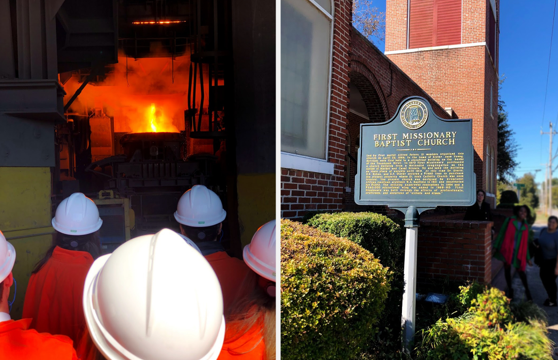
(Above, left) Students toured Nucor Steel, which employs about 720 workers. Students and employees discussed a range of topics, including global trade and steel tariffs. (Right) Founded in 1866, First Missionary Baptist Church is the second-oldest African American Church in Decatur, Alabama. (Below) Students visited Martin Farms, a cotton producer dating back more than 100 years. The visit sparked discussion of cotton farming in the South and its effects on race. Photography: Gwen Shufro
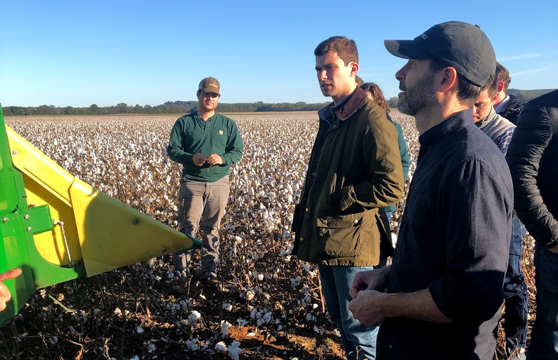
“For those who have been directly affected by racial discrimination, they were very strong in saying that racial divides are the primary one. For others, it was class and economic well-being. For some, it was regional and geographic. One of the takeaways from the course is that how you see things depends upon your own background.”
—Professor Todd Jick
Listening to Understand
Jick and Usher try to impart that learning about others’ experiences is crucial for business leaders. It’s life experience, they say, that informs how their colleagues, employees, or business partners will approach everything—from how they initiate projects to how they solve problems. In the first class session, students are asked what they see as the biggest divide in the US. “For those who have been directly affected by racial discrimination, they were very strong in saying that racial divides are the primary one,” says Jick. “For others, it was class and economic well-being. For some, it was regional and geographic. One of the takeaways from the course is that how you see things depends upon your own background.” Usher adds that another requirement for the class is active listening. “As business leaders, we are often taught to listen in order to respond. In this course, you listen to understand, which is really hard to do.”
Traveling to Youngstown and Decatur during the pandemic was impossible, so Jick and Usher did their best to bring the cities to the students. They welcomed nearly two-dozen guest speakers over the course of the semester, including the superintendent of the Youngstown public schools, two pastors from Decatur, the co-founder of Braver Angels, which facilitates workshops for people with opposing political viewpoints; the director of the documentary Reunited States; and an editor from ProPublica.
Without the ability to travel, students spent more time in class exploring solutions to the issues. “We put a big emphasis this year on bridging,” says Jick, who invited people from organizations that focus on facilitating effective dialog or who are implementing concrete solutions on a local level.
“The course has been a transformational learning experience—I feel as if I have grown personally and professionally throughout these 12 weeks and have gained tremendous maturity in my ability to think about and respond to the deep divides within our country.”
—Anna Houseman ’21
Tackling Real-World Problems in a Virtual Classroom
The professors worked hard to make the course succeed virtually, and it showed, says Anna Houseman ’21, who was also a TA for the class. “The course has been a transformational learning experience—I feel as if I have grown personally and professionally throughout these 12 weeks and have gained tremendous maturity in my ability to think about and respond to the deep divides within our country.”
Fostering this kind of personal growth is something the professors hope to achieve, and they stress that they aren’t out to change anyone’s mind, but to get them to consider other views and learn how to listen.
Jick and Usher say they were especially heartened by one element of the class: On the third week, the students watched a New York Times documentary about a ball-bearing plant in Indiana that would soon be moving operations to Mexico. For weeks after, students brought up the film, and Jick says he noticed perspectives slowly shifting. “If you did the balance sheet, you would say you would be much better off as a company producing your parts in Mexico. The students, who instinctively as business people agreed with that, heard about some of the community impacts and began to shift to consider the obligations of business to the communities that depended on them. The ones that were very sensitive to the community impacts began to understand the total logic behind the business decision, and some of them shifted their opinions.”
It’s this willingness to explore the issues that will make the students effective business leaders, says Usher. “Ideally, they find themselves conflicted. I say ideally, because that’s where we want them to be—in an uncomfortable place,” he says. “Our primary objective here is to get them to understand, to be aware of these challenges, to understand that their decisions have these implications and they’re real. It may be aspirational, but we try to push them to a place of finding solutions and bridging.”
Some students have already begun implementing what they’ve learned. Livers-Powell was so committed to spreading the lessons from Bridging the American Divides to other CBS students that she and Mariah Celestine ’20, a class TA, worked with Gita Johar, vice dean for diversity, equity, and inclusion, to create the Phillips Pathway for Inclusive Leadership (PPIL), a combination of programs and workshops designed to equip students with skills for managing diversity. (Read more here.)
“We want all students to have the skills to have difficult conversations, to create inclusive environments, and to be able to apply this knowledge to any industry no matter what position they hold,” Livers-Powell says.
Making even a small impact was what Horton says he had in mind when he came up with the idea for the class. “I don’t think we had any grandiose ideas about how you solve the problem of a social divide,” he says. “Creating the class seemed like a small step we could take to address polarization. But if it affects the way a couple hundred students behave when they go out in the world, then maybe it’s not so miniscule.”
